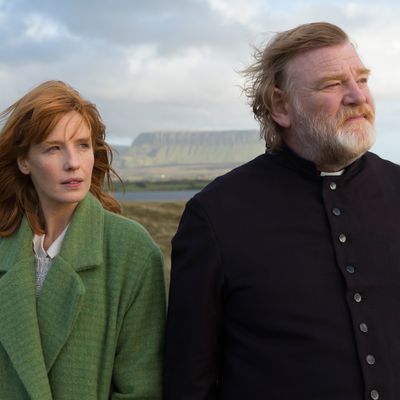
In Calvary, a priest, Father James Lavelle (Brendan Gleeson), spends what might be the last week of his life with his faith under incessant, bitter assault. I mean, this guy puts up with one insult to his piety after another. The movie begins with Lavelle hearing a confession from an unseen man who says that for seven years, beginning at age five, he was raped by a priest, now dead, and that he’ll take revenge by killing a “good priest” — Lavelle — in a week’s time. In a different sort of film, Lavelle would jump out of the confessional and confront the man, or else go to the police and spell out the threat. In this one, Lavelle wanders moodily around the Irish West Coast as various other characters and possibly God Himself remind him of the corruption, impotence, and general irrelevance of the Catholic Church. It’s a test-of-faith movie.
Most test-of-faith pictures are painfully solemn, even Ingmar Bergman–esque, but writer-director John Michael McDonagh is the brother of playwright (now also filmmaker) Martin McDonagh, and they share a penchant for high moral seriousness enlivened — often jarringly — by an antic Hibernian spirit. I think Martin comes closer to getting the balance right, though. John Michael has evidently watched too many episodes of Twin Peaks, and Calvary is crammed with strange, over-the-top, self-consciously “quirky” performances — unmodulated, in different keys, the characters framed with the bluntness of a carnival barker showing off his freaks. Those shots are in contrast to those landscapes, which are craggy, primordial. It’s meant to be a haunting combination, and I have colleagues who’ve found it just that, who came out of the movie ashen, devastated. But I found it bludgeoning — I think it gives new meaning to the phrase hammer of God.
Here is a partial list of the people Father Lavelle encounters in the week after he learns he might soon die: a tauntingly atheist doctor (Aiden Gillan); a dishy, unapologetically promiscuous married congregant (Orla O’Rourke); the foulmouthed African mechanic (Isaach De Bankole) who’s sleeping with her; and a rapist-murderer (Domhnall Gleeson, Brendan’s son) who taunts Lavelle with the idea that, while killing, he’d felt like God.
You want more? There’s a dull-witted assistant priest (David Wilmot) who suggests a sad future for the church, a derisive rich man (Dylan Moran) who proves he’s beholden to nothing by urinating in front of Lavelle on a revered oil painting, a preening little gay hustler (Owen Sharpe) with no apparent shirt and a dangling cross, the nerd (Killian Scott) who’s feeling rage against women for not paying attention to him (shades of Elliot Rodger), the elderly American writer (M. Emmet Walsh) who’d like a gun to hasten his own death … It’s a wonder Father Lavelle doesn’t pitch himself off a cliff. By far the nicest person he hangs out with is his daughter, played by Kelly Reilly (Lavelle joined the priesthood when his wife died), who still feels that he abandoned her for the church and that she lost both parents in one fell swoop. She has just cut her wrists.
Oh, I forgot — there is one person who accepts him, a Frenchwoman (Marie-Josee Croze) whose husband has just been killed by a drunk driver. That’s what belief gets you, evidently.
Plus, someone sets fire to his church. How was your week?
All this is accompanied by arch dialogue that calls attention to the characters’ sense of being characters. In one scene, the atheistic doctor actually refers to himself as, “the atheistic doctor … a cliché part to play.” So why, then, does he play it? Good actors like Chris O’Dowd, Moran, Gleeson, and Walsh are acting their hearts out, but they can’t make these characters seem like more than puppets.
There would be no movie, of course, without an actor the stature of Brendan Gleeson, who’s stubbornly, messily alive, carrying Calvary from first frame to its almost-last. He’s grizzled and ginger-haired, his face prodigiously lined with heavy, sagging features, and pieties don’t fall easily from his mouth. His Lavelle doesn’t pander or conceal his contempt. He radiates frustration and helplessness. But he keeps on … and on … as people rail at him, as what’s bad gets worse and what’s worse gets unspeakable.
In the end, though, his enforced passivity in the face of all these cartoon ranters is a challenge not just to the church but to the spirit of drama. Whether you’re moved by a man who, in spite of everything he knows, feels a duty to lumber toward his promised end, might well depend on the faith in which you were raised and/or how you feel about it now. I found the combination of sideshow horrors and martyrdom an offense to everything I deem holy. Maybe it would play with music, like Les Miz.


